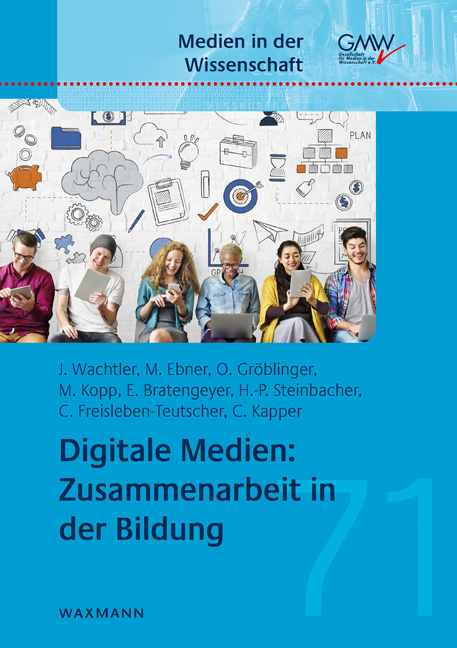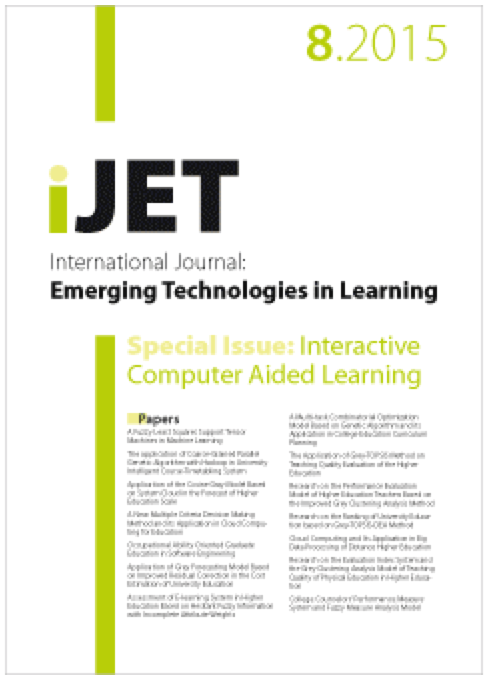Last friday I gave a keynote at „Education in The Digital Age & Multicultural Society” conference about emerging technologies in education. Here are my slides:
Klicken Sie auf den unteren Button, um den Inhalt von www.slideshare.net zu laden.

Digitale Lehre an und rund um der Technischen Universität Graz
Last friday I gave a keynote at „Education in The Digital Age & Multicultural Society” conference about emerging technologies in education. Here are my slides:
Klicken Sie auf den unteren Button, um den Inhalt von www.slideshare.net zu laden.
As part of the Workshop on Smart Environments and Analytics in Video-Based Learning at this year LAK`16 conference our contribution about “On Using Learning Analytics to Track the Activity of Interactive MOOC Videos” got published.
Abstract:
It is widely known that interaction, as well as communication, are very important parts of successful online courses. These features are
considered crucial because they help to improve students’ attention in a very significant way. In this publication, the authors present an innovative application, which adds different forms of interactivity to learning videos within MOOCs such as multiple-choice questions or the possibility to communicate with the teacher. Furthermore, Learning Analytics using exploratory examination and visualizations have been applied to unveil learners’ patterns and behaviors as well as investigate the effectiveness of the application. Based upon the quantitative and qualitative observations, our study determined common practices behind dropping out using videos indicator and suggested enhancements to increase the performance of the application as well as learners’ attention.
Reference: Wachtler, J., Khalil, M., Taraghi, B. & Ebner, M. (2016). On Using Learning Analytics to Track the Activity of Interactive MOOC Videos. Paper presented at LAK 2016 Workshop on Smart Environments and Analytics in Video-Based Learning, Edinburgh, United Kingdom, 26/04/16 – 26/04/16, pp. 8-17
Our chapter on “How OER Enhances MOOCs—A Perspective from German-Speaking Europe” got published as part of the book Open Education: from OERs to MOOCs.
Abstract:
In this chapter, we discuss why OER and MOOCs are a necessary and pow- erful combination, especially in German-speaking Europe. We begin with an introduc- tion to open online courses and an overview of copyright law in Germany and Austria. We then describe the evolution of OER MOOCs in Austria and Germany, especially the development of two MOOC platforms. Finally, we present examples of the impact of OER on MOOCs to conclude that an approach combining OER and MOOCs can be very valuable to foster new and innovative didactical approaches as well as future education.
Reference: Ebner, M., Lorenz, A., Lackner, E., Kopp, M., Kumar, S., Schön, S., Wittke, A. (2016) How OER enhance MOOCs – A Perspective from German-speaking Europe. In: Open Education: from OERs to MOOCs. Jemni, M., Kinshuk, Khribi, M. K. (Eds.). Springer. Lecture Notes in Educational Technology. pp. 205-220
Für das neue OCG-Journal zum Thema “Der Weg zur Bildung 4.0” haben wir einen kurzen Beitrag rund um unsere Erfahrungen mit den Makerdays geschrieben. Auch haben wir auf unser Handbuch verwiesen, welches alle weiteren Details enthält.
[Link zum Beitrag @ ResearchGate]
Referenz: Schön, S., Ebner, M. (2016) Digitales kreatives Selbermachen in der Schule. OCG-Journal, 02/2016
Die GMW in Innsbruck war noch nicht vorbei, als ein erster Bericht zur Konferenz von außen geschrieben wurde. Zwar war es nicht im Detail abgesprochen, aber die gemeinsame “Performance” rund um einen Beitrag von Kollegen zu “Offene Lizenzen als Treiber für neuartige Kooperationen und Innovationen in der Bildung” und mir wurde im Blog der FU Berlin zur Lehre und Wissenschaft 2.0
lobend erwähnt. So wie meist hatten Sandra und ich unsere Materialien schon im Vorfeld online – und Andreas Wittke hat dann noch mit Hilfe von Periskope live Einblicke in unseren Beitrag gegeben. Von “außen” konnte man so vermutlich sogar noch mehr und in Ruhe unseren Beitrag studieren 🙂 – Und fein, dass das so gut ankommt!
Am 17.10.2016 startet ein weiterer MOOC auf iMooX: “Learning To Code“. Wir laden dazu herzlich vor allem Schulkinder und ihre Lehrenden ein mitzumachen, denn der Kurs wurde speziell dafür entwicklet. Auch haben wir noch ein paar “Bierdeckel” als Werbematerial. Wer daran Interesse hätte, dem kann ich gern ein paar noch zusenden (bitte mir eine E-Mail an martin.ebner [at] tugraz.at schicken und die Anschrift mitteilen).
Kursinhalt:
Bezüglich Programmieren bestehen viele Vorurteile und Ängste. Mithilfe von Pocket Code sollen vor allem Kinder erste Erfahrungen mit dem Programmieren sammeln. Durch eine einfache und visuelle Benutzeroberfläche wird eine spielerische Umsetzung eigener Ideen ermöglicht.
Der Kurs richtet sich somit an Kinder und Jugendliche (Altersgruppe 10-14 Jahre) und hat als Hauptinhalt das Erstellen eigener Spiele, interaktiver Animationen sowie Apps mithilfe von Pocket Code. Primär werden dabei Struktur und Funktionsweise der App vorgestellt, im Hintergrund werden „Computational Thinking”-Konzepte erarbeitet wie zum Beispiel: Konditionale, Variablen, Events oder Parellelismus. Dabei ist es den Kindern überlassen ob sie die den Kurs selbsständig oder gemeinsam mit ihren Eltern machen.
At this year HCII conference we present a short overview about the IderBlog-project, titled “Learning Analytics and Spelling Acquisition in German-A First Prototype”
Abstract:
Data-driven learning in combination with emerging academic areas such as Learning Analytics (LA) has the potential to tailor students’ education to their needs [1]. The aim of this article is to present a web-based training platform for primary school pupils who struggle with the acquisition of German orthography. Our objective is the improvement in their writing and spelling competences. The focus of this article is on the development of the platform and the details concerning the requirements and the design of the User Interface (UI). In combination with Learning Analytics, the platform is expected to provide deeper insight into the process of spelling acquisition. Furthermore, aspects of Learning Analytics will help to develop the platform, to improve the exercises and to provide better materials in the long run.
[Draft version @ ResearchGate]
Reference: Ebner, M., Ebner, M., Edtstadler, K. (2016) Learning Analytics and Spelling Acquisition in German-A First Prototype. International Conference on Learning and Collaboration Technologies. pp. 405-416. Springer International Publishing
Im Rahmen der heute stattfindenden iUNIG-Tagung zu Seamless Learning darf ich über unsere Forschungsergebnisse zum Einsatz einer Smartwatch in Kombination mit einem Audience-Response-System berichten. Hier gibt es einmal die Vortragsfolien dazu:
Klicken Sie auf den unteren Button, um den Inhalt von www.slideshare.net zu laden.
 Der Tagungsband der heurigen Jahrestagung der Gesellschaft für Medien in der Wissenschaft, kurz GMW, in Innsbruck ist online frei zugänglich erhältlich. Ich bedanke mich noch bei meinen Kollegen und Kolleginnen für die tolle Zusammenarbeit.
Der Tagungsband der heurigen Jahrestagung der Gesellschaft für Medien in der Wissenschaft, kurz GMW, in Innsbruck ist online frei zugänglich erhältlich. Ich bedanke mich noch bei meinen Kollegen und Kolleginnen für die tolle Zusammenarbeit.
Abstract:
Der Begriff „Neue Medien“ ist den Teenagerjahren inzwischen entwachsen. Vieles, was vor 15 Jahren darunter verstanden wurde, ist mittlerweile selbstverständlicher Teil unseres täglichen Arbeits- und Privatlebens. Den digitalen Wandel und seine Dynamik zu beobachten, ihn kritisch zu hinterfragen, aktiv zu gestalten und wissenschaftlich zu begleiten, ist eine zentrale Aufgabe der Gesellschaft für Medien in der Wissenschaft e.V., kurz GMW.
Dieser Band versammelt die Beiträge der Jahrestagung 2016 unter dem Titel „Digitale Medien: Zusammenarbeit in der Bildung“. Zentrales Thema sind dabei die Schnittstellen zwischen Institutionen, Lernenden, Lehrenden, wissenschaftlichen Disziplinen und Technologien, wobei insbesondere technologiegestützte Möglichkeiten der Zusammenarbeit in der Gestaltung von Bildungsangeboten betrachtet werden.
Zitation: Wachtler, J., Ebner, M., Gröblinger, O., Kopp, M., Bratengeyer, E., Steinbacher, H.-P., Freisleben-Teutscher, C., Kapper, C. (2016) Digitale Medien: Zusammenarbeit in der Bildung. Waxmann Verlag
 Issue 11(8) of our journal on emerging technologies for learning got published. Enjoy the readings as usual for free :-).
Issue 11(8) of our journal on emerging technologies for learning got published. Enjoy the readings as usual for free :-).
Table of Contents:
Nevertheless, if you are interested to become a reviewer for the journal, please just contact me :-).